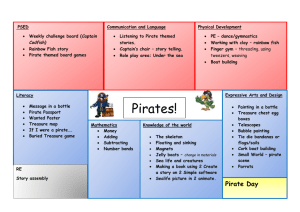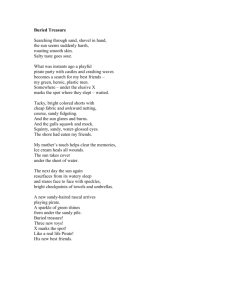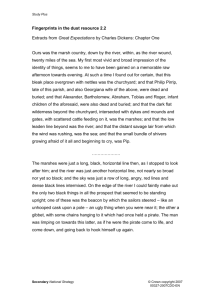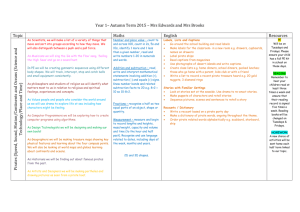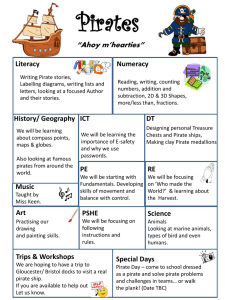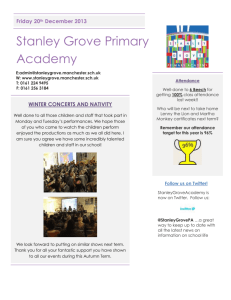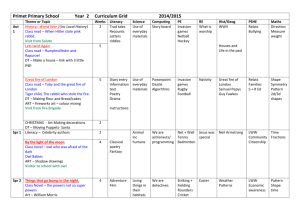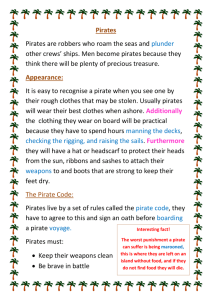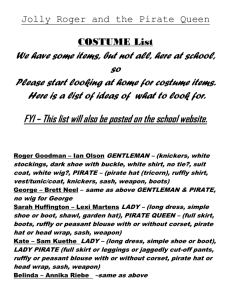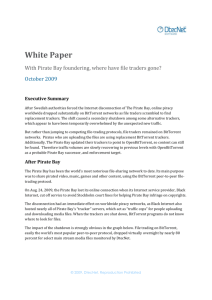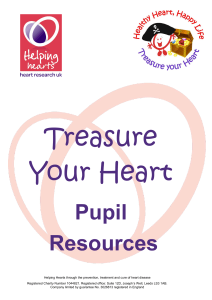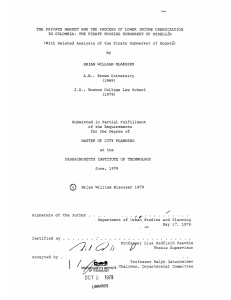Week 1 – Marine Habitats - Bishop Ellis Catholic Primary School
advertisement
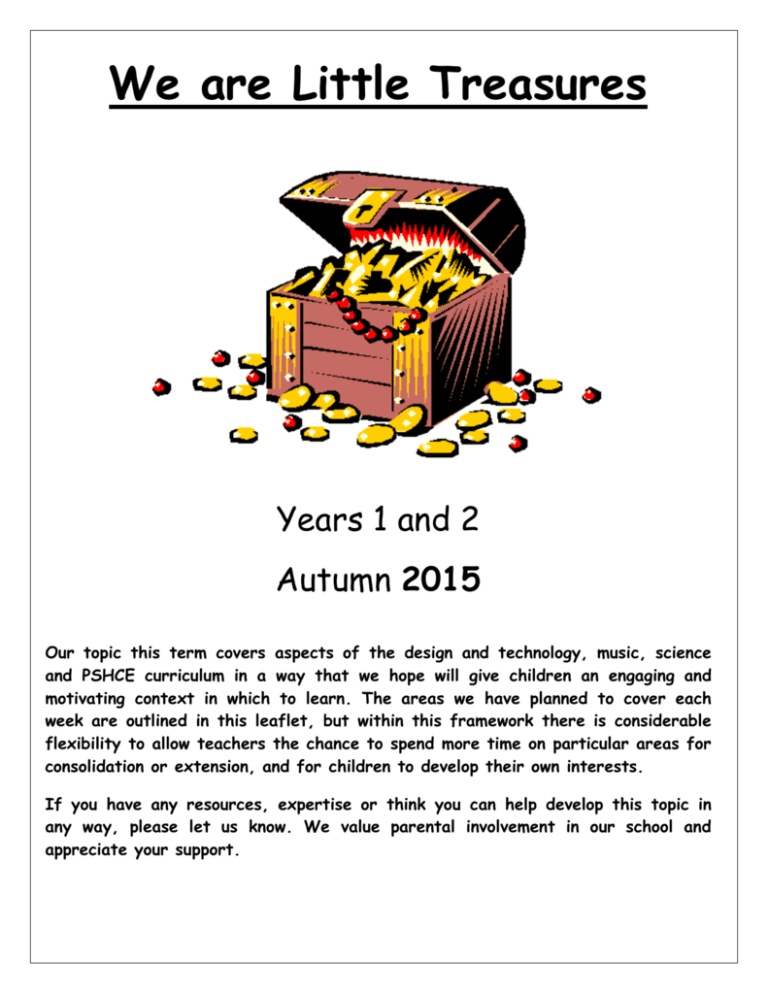
We are Little Treasures Years 1 and 2 Autumn 2015 Our topic this term covers aspects of the design and technology, music, science and PSHCE curriculum in a way that we hope will give children an engaging and motivating context in which to learn. The areas we have planned to cover each week are outlined in this leaflet, but within this framework there is considerable flexibility to allow teachers the chance to spend more time on particular areas for consolidation or extension, and for children to develop their own interests. If you have any resources, expertise or think you can help develop this topic in any way, please let us know. We value parental involvement in our school and appreciate your support. The Big Question! We are continuing our use of a BIG QUESTION which links into the topic. This will allow children to explore, learn, think deeply and refer back to the big question: How would a pirate create a healthy lunch? In addition to this, we will use the children’s ideas and lines of enquiry such as ‘Can we build a pirate ship?’, ‘What can we eat to keep ourselves really healthy?’ and ‘Why do pirates wear eye patches?’ 1st-4th September: The Big Launch In the first few days back after the holidays, we will be launching our new topic and exploring some of the children’s questions and suggestions. On Friday 4th September, we will have a pirate dressing up day and treasure hunt. The children will find coins with letters on and use them to spell secret pirate words. 1st-18th September: Songs at Sea! The children will practising to be pirates by learning the names of the Oceans and locating these on a world map. We will also be learning some pirate songs and the children will add their own actions and create a musical score for the song. They will also play instruments to accompany their singing. 14th September- 5th October: A Pirate’s Life for Me – Healthy Eating We will be thinking about what makes a healthy lunch. The children will design a healthy meal for a pirate and then visit ASDA to buy the ingredients. All of this culminates in a picnic where we will eat our picnic lunches and sing a pirate song that we have been learning. We hope to invite parents and carers to this event. More details to follow. Other activities: -The children will have some discrete ICT lessons on coding in line with the new National Curriculum. -We are also looking forward to our annual visit from the ‘Life Bus’ and towards the end of the half-term, the children will enjoy a visit from a pantomime company. Homework All children will have a reading book at their level and a library book that they have chosen, which may or may not be at their level. (Library books will usually be changed once at week.) Most children will bring home a list of spellings each week that they have been learning in their phonics group. They will need to practise these words throughout the week (a few minutes each day is best) for a written spelling quiz on Mondays. Spelling books must be in school on Mondays. The children will also be asked to complete additional tasks at home which will link directly to, and support, work being covered in the classroom. It is recommended that your child reads at home every day. Please write a comment in their reading diary to indicate how well they read, how much they read and any problems that they may have had. Reading books and diaries need to be in school every day. Mathematics For maths, the biggest focus in the National Curriculum is on number. Most children in Year 1 will be working on: -counting, reading and writing numbers to 100; -counting in different multiples including ones, twos, fives and tens; -saying one more and one less; -identifying using objects and pictures and using the vocabulary of: equal to; more than; less than (fewer); most; least; -adding and subtracting 1-digit and 2-digit numbers to 20 (9 + 9, 18 - 9), including zero; - adding three 1-digit numbers (e.g. 3+6+7); - recalling and using number bonds and related subtraction facts within 20 (e.g. 6+4, 16+4). Most children in Year 2 will be working on: -reading and writing numbers to 100 and beyond in numerals and in words; -recognising the place value of each digit in a 2-digit number (tens, ones); -counting in steps of 2, 3, 5 and 10; -comparing and ordering numbers from 0 up to 100; -arranging, reading and writing numbers in increasing and decreasing order; -solving problems using place value and number facts; -rapidly recalling and using addition and subtraction facts to 20 (e.g. (17+3, 13+5) -adding and subtracting numbers mentally including: a 2-digit number and ones (33-6) and a 2-digit number and tens (46+20); -recognising that addition can be done in any order and subtraction cannot. English Performance Poetry: In the National curriculum, there is a focus on learning poetry by heart. In the first half-term, we will be holding a performance poetry competition. Children will be given time in class to select and start practising their poem but they will need to do some practice at home as well, especially if they want to go through to the finals for the chance to win some exciting prizes! Y1 Labels, Lists and captions: Children will hunt for labels and captions in the classroom and school environment and they will create their own by hand and using a computer. This unit will culminate with children creating a book linked to our topic on Fire! Fire! about fire engines and fire fighters with labels and or captions working in a group or independently. Y1 Instructions: The children will hear oral instructions and practise giving and following oral instructions. They will learn how to follow simple written instructions and look at the features of written instructions. The teacher and children will write a set of instructions together and then the children will write their own simple instructions. Y2 Classical Poetry: The children will listen to and learn a variety of classical poetry including The Owl and the Pussy Cat and the Sound Collector. The will explore some of the more challenging language in this genre of poetry. The children will also have the opportunity to create their own poems based on some of the poems that they have been learning. Y2 Stories with familiar settings: Children read and tell a selection of stories. They will learn to retell stories in pairs focusing on the sequence of events and specific story phrases which they can then use in their own writing. They identify the characters and use role-play to retell the story considering a character’s thoughts and feelings and explore different courses of action. The children will describe a character considering their appearance and personality. As the unit continues, they will develop their ability to plan and write their own stories. We hope you have found this information useful. If you have any questions or comments about the information on this sheet, then please contact your child’s teacher, who will do their best to help.
